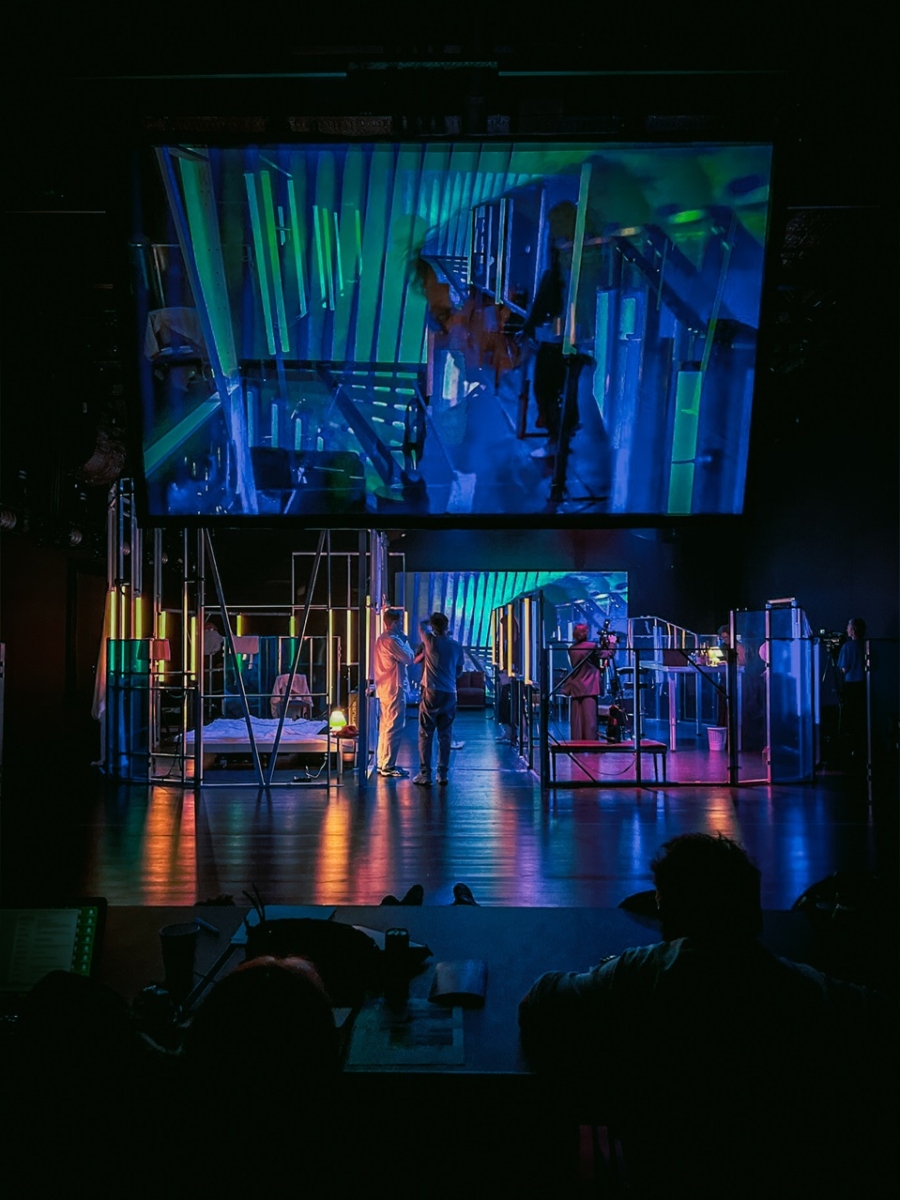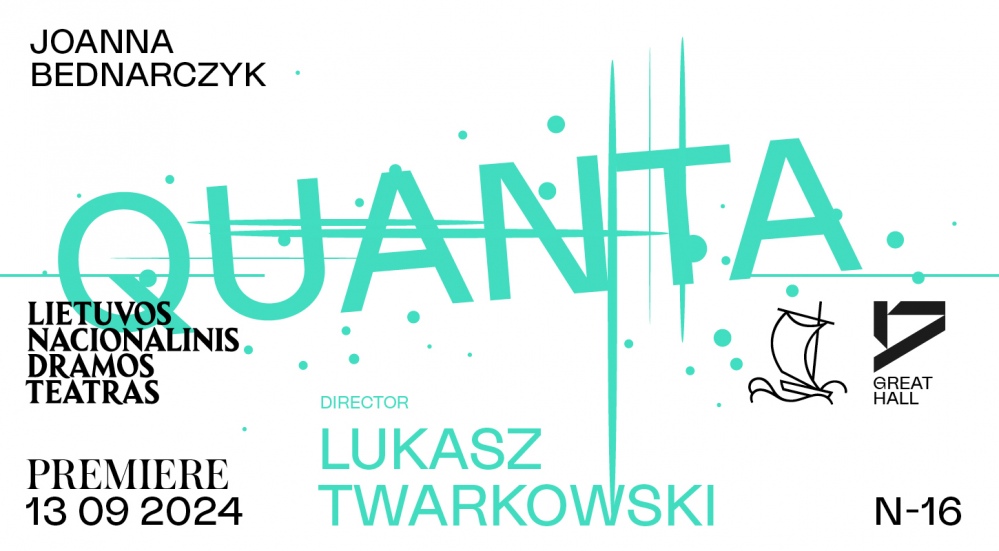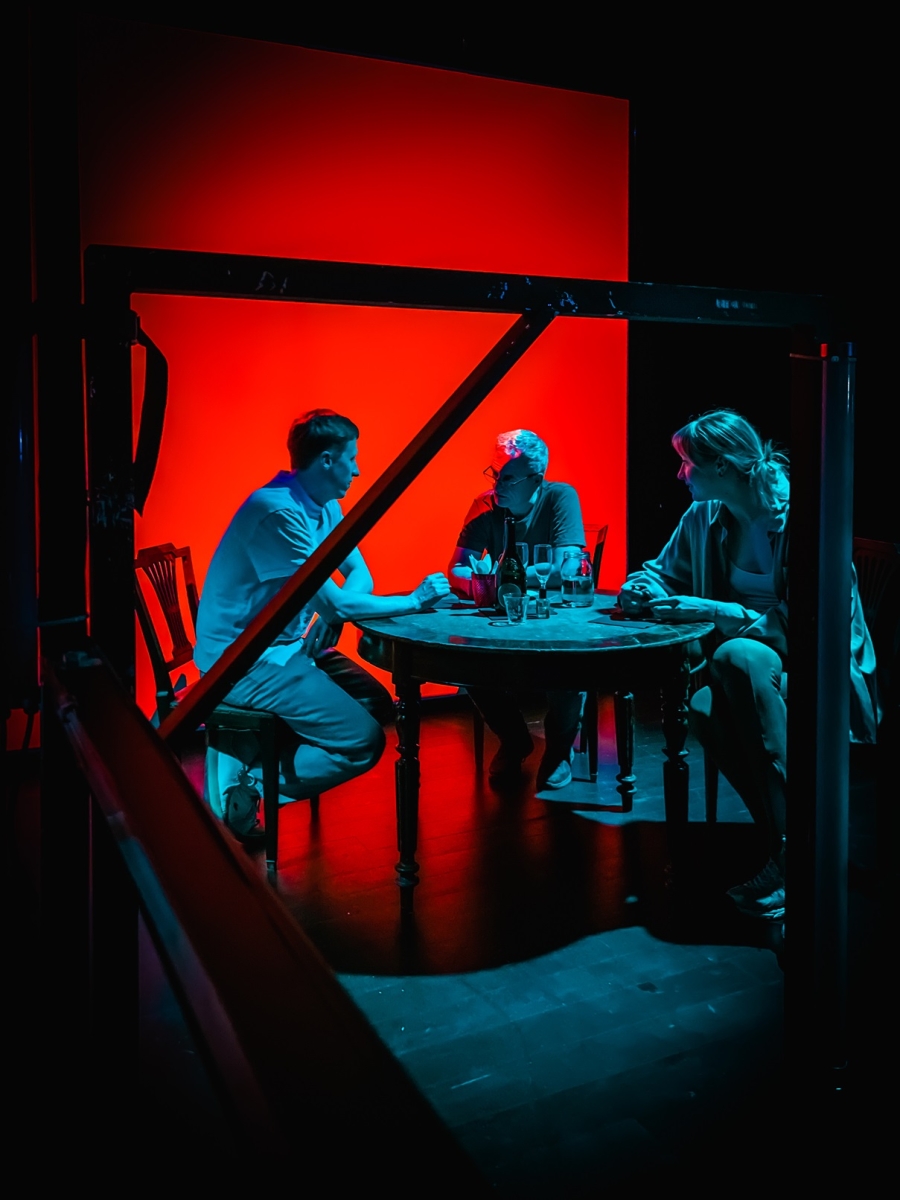On 13 September 2024, the 85th artistic season at the Lithuanian National Drama Theatre in Vilnius will begin with the premiere of “Quanta” – a theatre play by Polish director Łukasz Twarkowski. Together with the author of the play, Joanna Bednarczyk, he will delve into the realm of quantum physics. The Adam Mickiewicz Institute is the co-producer of the play.
Łukasz Twarkowski – globally recognised Polish theatre director
Łukasz Twarkowski is currently one of the most recognisable Polish theatre artists around the world. He began his directing career at the Lithuanian National Drama Theatre and has since presented his plays at festivals and on stages of the greatest importance in Europe. In his multi-media productions, Twarkowski combines theatre with visual arts. Exploration of possibilities and limitations of theatre as a medium and communication tool represents a significant element of his work.

Rehearsals for the play "Quanta". Photo Fabien Lede.
The Adam Mickiewicz Institute has supported the artist for many years now. As explained by Olga Brzezińska, Deputy Director of the Institute:
‘The avant-garde theatre forms an important part of Polish cultural heritage. Despite entering into dialogue with various streams of performative arts, Łukasz Twarkowski’s works are characterised by a high level of innovation. They amaze us with formal solutions, methods of presenting the themes and their message. I am certain that this is the art that is well-tailored to our times, therefore it is worth watching, discussing and supporting.’
“Quanta” – a play about quantum physics
In his play “Quanta”, Łukasz Twarkowski focuses on the quantum physics and – what is common to his work – wants to engage viewers through all of their senses. He is interested in what is happening in the viewers’ minds. Therefore, he applies a hybrid theatrical method combining sound design, music, video screenings, cinema, live acting and choreography in order to create a unique experience and find a language that, instead of following the script and telling a tale, will act on sensory platforms.
In “Quanta”, viewers are transferred to inter-war Switzerland. At a mountain hotel, strange things will happen within one day. Physical features of space and time will be disturbed, which will affect scientists dealing with quantum physics, artists and other hotel guests. Nobody will understand what is going on.
‘Quantum physics is very interesting as it requires you to start thinking differently, to forget about everything you knew about physics. When people start pondering over quantum physics, they find it simply impossible as it rests on contradictions and there is no logic whatsoever here. However, one can discover how beautiful it is since it allows us to believe in the free will (...)’ – says Łukasz Twarkowski.
Joanna Bednarczyk’s play about quanta, time and a Swiss hotel in the inter-war period
The Les Moires hotel is the only bright spot within kilometres. Far from popular tourist routes, it exists as if time had no effect: it neither dilapidates nor becomes younger; it simply exists. Although Les Moires does not experience time itself, the fates of its residents are accelerated compared to what is happening closer to the surface of the earth. The fact that this acceleration is noticeable contradicts all laws of classical physics. Minutes and seconds seem to be more compressed in time, therefore there is more of them during one day and one night than an ordinary clock would measure. Acceleration of a certain feature of the physical world, which could be referred to as quanta of events, also takes place. What should be understood under the term ‘quantum’? In Latin, the word ‘quantum’ means ‘how much’. In physics, a quantum describes the smallest portion a given physical quantity can become or by which it can change as part of a single event.
Rehearsals for the play "Quanta". Photo Fabien Lede.
Life consists of quanta of events. Events occur one after another and form a single history. Multiplicity of events, feelings and reports forms fragments of a narrative that divides into the past, present and future. Time governs each story and makes it comprehensible – first there is a cause, then an effect, and each action triggers reaction. But when time starts accelerating, it ceases to be time in itself and becomes something we do not understand: a multiplicity of quantum events that no longer form a clear reality. This is exactly what happened on a certain summer evening of 1938 at the Les Moires hotel in the Swiss mountains. Physical, spatial and temporal properties have been disturbed. This was also felt by the hotel guests. Something in their memories, attitudes, emotions and desires began to change. The guests include a well-known German physician Werner Heisenberg, the author of the uncertainty principle. Is it that the reality of large objects (such as a desk, hotel, mountains) began to behave as the reality of elementary particles?
According to Heisenberg, we can talk about particles only in approximation – by describing their state of existence instead of themselves. Only through modifying the manner of conception from ‘what is an object’ into ‘what is the state of an object’ can the hotel guests comprehend what is happening to them and around them. They came to Les Moires to take a look at the world from the perspective of high mountains, to search for a deeper meaning in a broader context. But what if this meaning cannot be found in the Swiss landscapes, but in a single quantum: emotion, event, communication?
Polish theatre art at the Lithuanian National Drama Theatre in Vilnius
The set design has been prepared by Fabien Lede. Video presentations have been created by Jakub Lech. Costumes have been designed by Svenja Gassen. Music has been composed by Lubomir Grzelak. Eugenijus Sabaliauskas is responsible for light direction, whereas Paweł Sakowicz for choreography. The play by Joanna Bednarczyk has been translated from Polish to Lithuanian by Vyturys Jarutis. The play stars Vainius Sodeika, Nelė Savičenko, Rytis Saladžius, Airida Gintautaitė, Rasa Samuolytė, Algirdas Dainavičius, Martynas Nedzinskas, Gediminas Rimeika, Rimantė Valiukaitė, Arūnas Vozbutas, Aistė Zabotkaitė and Marius Čižauskas.
“Quanta” has been prepared in collaboration with Onassis Culture Athens, Boska Komedia/Divine Comedy International Theatre Festival in Krakow, De Singel Theatre in Antwerpen and the National Theatre Brno (Czechia). Financial support has been provided by the Adam Mickiewicz Institute. The production has been supported by the Ministry of Culture of the Republic of Lithuania. “NewError” is a partner of the play.

The premiere of “Quanta” will take place on the main stage of the Lithuanian National Drama Theatre on 13 and 14 September 2024. In October, the play will be shown in Athens, in December – in Krakow, while in February 2025, it will be presented again in Vilnius. More information on iam.pl and teatras.lt


